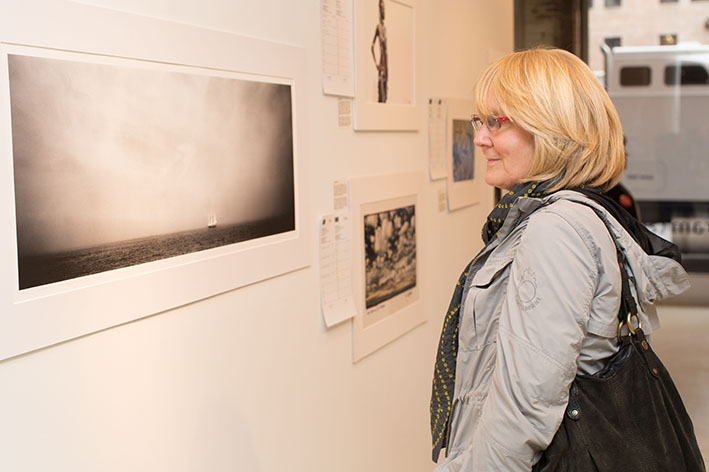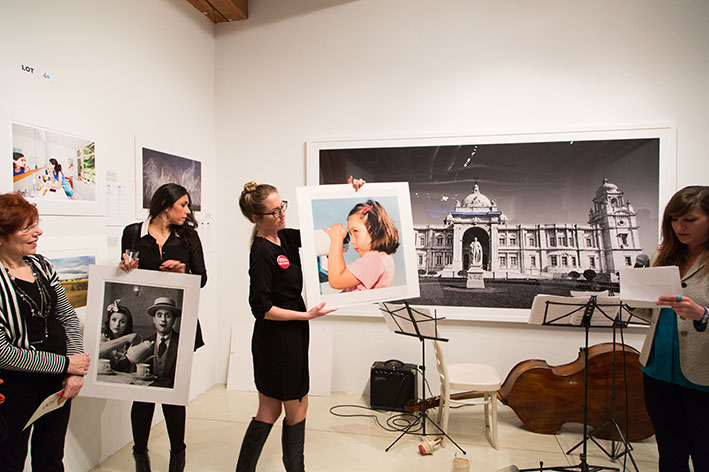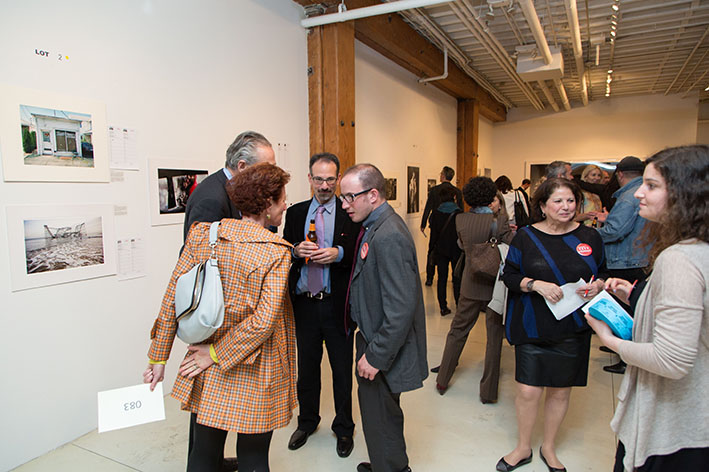THIS EDITION
Friends and Colleagues
Inside PROOF
- Our Benefit Auction Brought Riches of Many Kinds
- Traveling With PROOF: “Legacy of Rape” Exhibit in Colombia
- Child Soldiers Exhibit on Display in South Africa
- “The Rescuers” Spreads the Idea of the Upstander
"Picturing Moral Courage: The Rescuers" on display at the Holocaust Museum Houston.
Friends and Colleagues
Nigeria is no stranger to human rights violations. Just recently, its president signed a law criminalizing same sex marriage.
But the latest atrocity—the kidnapping of 276 schoolgirls by the terrorist group Boko Haram on April 14—has captured the world’s attention, while firing the resolve of people across the country.
In the face of this shocking human rights abuse against children and adolescents, Nigerians are sharply criticizing their government’s sluggish response and the disinterest of its security forces in entering the fray.
Nigerians across the country have vowed to demonstrate every day until the government does more to bring the girls back. This, in a country where more than half of children do not go to school, and girls are born into deeply patriarchal societies where child brides of 12 or 13 years of age are the norm.
We support the Nigerian demonstrators as well as the international pressure on the Nigerian government—through diplomacy, street protests, and every other possible means—to redress this terrible wrong.
Though international law requires governments to protect women and girls, violence against them is a global scourge that is particularly heinous in conflict zones. In Africa, terrorizing the innocent and powerless represents a tragic continuation of the continent’s 20th-century human rights calamities.
We cannot be silent.
Let’s join the global outcry of the #BringBackOurGirls posters—the campaign that began on Twitter—and chant with our fellow upstanders: "Bring them home!" "Not for sale!" "African lives matter!"
Inside PROOF
Our Benefit Auction Brought Riches
of Many Kinds
April 28 was an evening of inspiring photos, great fun, and good finance. PROOF's Annual Photography Auction and Benefit inspired over 200 attendees to purchase virtually all the photos up for bid!
Proceeds will support our human rights education and visual projects around the world, especially our latest initiative, “The Legacy of Rape,” in India, Nepal, and Colombia.
We are immensely grateful to everyone involved, including the contributing photographers, organizational supporters and sponsors, the Sundaram Tagore Gallery, and our guests, who all helped make the evening a success.
Traveling With PROOF
“Legacy of Rape” Exhibit in Colombia
"The Legacy of Rape" on display in Santa Marta, Colombia.
In May, PROOF Director Leora Kahn traveled to Colombia again, following the successful March opening of our “Legacy of Rape” project in Bogota. (See Field Notes March 2014: Traveling With PROOF.)
For this second trip, she attended the exhibition’s opening in Santa Marta, one of the communities affected by the violence.
Called "My Body: A War Zone," this latest exhibit shows images and testimonies of women who were victims of sexual abuse during the armed conflicts in Colombia, Bosnia and Herzegovina, Congo, and Nepal.
Displaying these exhibits in public spaces raises awareness of the toll taken by the atrocities that coexist with armed conflict. “My Body: A War Zone” exposes the pain and stigmatization that follows sexual abuse while working to bring solace and justice for survivors.
Speaking at the May event, Leora told the crowd:
“We are here today so that Maria's and Rosa's voices and the voices of other courageous women like them can be heard. We must take the gift of their courage and use it to compel governments and NGOs to act. We must make the reality of rape be heard and seen by entire communities. One woman's voice is a whisper, but a whole community of voices is a mighty force for change!”
The president of the University of Magdalena was so inspired by the women’s testimonies, he made a commitment to take the exhibit around the region together with workshops for high school and college students. This step is vital in a region that is still recovering from intense conflict, including gender-based violence.
Leora spoke to a group of college students attending the opening of the exhibit who are planning to work on human rights issues after they graduate. The young men were moved by the power of the women’s voices, which forced them to think about the violence against women in their country, and they vowed to fight for justice.
Most critical, the women whose images and testimonies were featured felt they were heard and respected for the first time since undergoing their traumatic experiences.
PROOF’s exhibition opened on March 10 in Bogota at the University of Los Andes, and on May 15 at the Art Museum of the University of Magdalena, where it will be on display until June 30. It was sponsored by PROOF, UNFPA, the UN Refugee Agency (UNHCR), Gender-Based Violence Information Management System, University of Los Andes, University of the AndeIt, and University of Magdalena.
Child Soldiers Exhibit on Display
in South Africa
"Liberia" by Q Sakamaki
The Office of the Representative of the Secretary-General for Children and Armed Conflict continues to bring PROOF’s Child Soldiers exhibit to countries around the world.
Sponsored by the Canadian Embassy in Durbin, the exhibit was displayed at the Alliance Françoise for a conference this past March addressing the issue of child soldiers in Africa.
“The Rescuers” Spreads the Idea
of the Upstander
"Picturing Moral Courage: The Rescuers", on display at the Holocaust Museum Houston.
How do you teach people to stand up to injustice rather than walk away?
PROOF's “The Rescuers: Picturing Moral Courage exhibition, which opened on March 28 at the Holocaust Museum of Houston, helps people sort through complex issues and provides outstanding role models to follow.
The exhibit portrays people who chose to act rather than turn away in the face of hatred, prejudice, and genocide, often risking their lives to save neighbors, strangers, anyone at risk. These ordinary citizens felt a moral obligation to rescue people their societies viewed as “the other." Many were humble people—farmers, taxi drivers, nuns, mothers, fathers—who gained little recognition for their heroism, making it even more critical to tell these stories before they are lost.
The exhibition’s collection of images and stories from Cambodia, Bosnia, Rwanda, and the Holocaust are based on Leora’s work researching and interviewing these notable upstanders.
At a reception on March 27, Leora expressed hope that, “These examples of ordinary heroes can inspire students to learn how to stand up against injustices they see in their own communities. If you can imagine yourself as an upstander, you can act as one.”
Holocaust historian at Clark University Debórah Dwork stated, “With the examples of these rescuers, we are now a little better prepared to give aid to those in danger, wherever and whenever that might be.”
Perspectives From Our Blog
Check out these blog posts published since our last newsletter:
The Horrific Plight of Ethiopian Migrants in Yemeni Smuggling Camps: Photojournalist Michael Kirby Smith Speaks on Capturing an Underreported Story
Making Sense of the Senseless: Religious Conflict in the C.A.R and a Reflection on the G-Word
Remembering Rwanda: Commemorating the 20th Anniversary of the Genocide
"Let the Rape Victims Come In"









